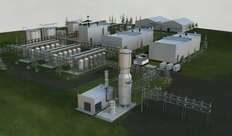- The project covers 2,234 km² in the Upper Rhine Valley with 17 licenses.
- Phase One aims for 24,000 tpa of lithium hydroxide monohydrate, enough for 500,000 EVs annually.
- Construction of the first well began in May 2025; main facilities start in early 2026.
- The project has EU 'Strategic Project' status and German government grant funding.

Project Overview
The Vulcan Lionheart Project aims to create a sustainable, carbon-neutral lithium supply chain in Europe. It utilizes geothermal brine from the Upper Rhine Valley to produce both battery-grade lithium and renewable energy.
Development Regions
The project focuses on four regions: Pfalz, Kurpfalz, Hessen, and Ortenau, with 17 granted licenses covering 2,234 km². Phase One is centered in Pfalz.
Core Technology
The project employs a two-stage process: the Geothermal and Lithium Extraction Plant (G-LEP) extracts lithium chloride from geothermal brine, while the Central Lithium Plant (CLP) converts it into battery-grade lithium hydroxide monohydrate using electrolysis.
Strategic Partnerships
A partnership with Nobian leverages their expertise in industrial electrolysis, enhancing the conversion process. The CLP's location in the Höchst Industrial Park offers shared infrastructure benefits.
Production Goals
The project targets a production capacity of 24,000 tonnes per annum of lithium hydroxide monohydrate, sufficient for 500,000 electric vehicles annually. Offtake agreements with major car manufacturers like Stellantis and Renault are already in place.
Timeline and Funding
Construction of the first well began in May 2025, with main facilities scheduled for early 2026. The project has received significant grant funding from the German government and holds "Strategic Project" status from the EU, aiding in permitting and financing.

